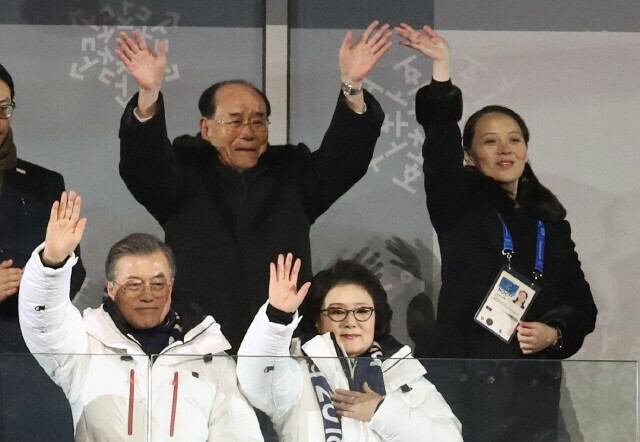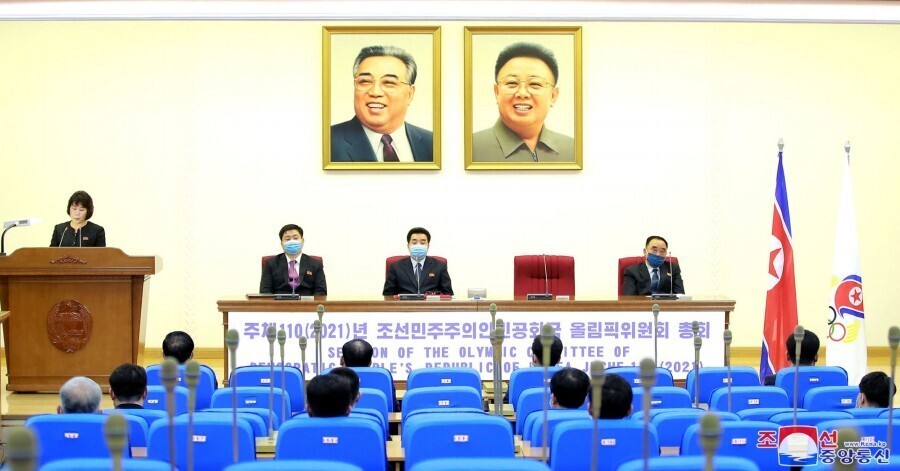hankyoreh
Links to other country sites 다른 나라 사이트 링크
N. Korea’s Olympic decision sets back Korean Peninsula peace process

North Korea’s abrupt announcement that it won’t take part in the Tokyo Olympics, which are scheduled to be held on July 23, threatens to ruin the South Korean government’s plan to use the Olympics as an opportunity to restart the Korean Peninsula peace process. Since the justification that Pyongyang offered for its decision is not the complicated political situation on the Korean Peninsula but rather the world health crisis caused by COVID-19, Seoul is likely to keep trying to persuade Pyongyang to reverse its decision.
A website operated by North Korea’s Ministry of Sports announced Monday that the country’s Olympic Committee had “decided, after discussing a motion made by committee members, not to participate in the 32nd Olympic Games to protect athletes from the global health crisis caused by an infectious disease caused by a virus [COVID-19].” The website said the decision was reached in a meeting in Pyongyang on March 25.
In its announcement, the North didn’t mention foreign policy considerations or any other factors other than COVID-19 as reasons for its decision to sit out of the Olympic Games. North Korea’s state-run Korean Central News Agency hasn’t published any articles on the topic.
The South Korean government has made enthusiastic diplomatic overtures to Japan to restore the two countries’ strained relations since Yoshihide Suga assumed Japan’s premiership in September 2020. Seoul’s stated reason for repairing relations was that it would do everything in its power to make the Tokyo Games a “Peace Olympics.”
Park Jie-won, director of South Korea’s National Intelligence Service (NIS), reportedly made a strong case for improving South Korea-Japan relations during a meeting with Suga on Nov. 10, 2020. Park said during their meeting that South Korean President Moon Jae-in is the only person who can ensure the peace of the Tokyo Olympics and help resolve the issue of Japanese abducted by the North.
In subsequent months, Moon has expressed his desire to use the Tokyo Olympics to improve inter-Korean relations and South Korea-Japan relations and use that momentum to reactivate the Korean Peninsula peace process.
“We must cooperate to ensure that this year’s Tokyo Olympics are successful and safe from COVID-19 and treat the games as an opportunity for improving relations with Japan and advancing peace in Northeast Asia,” Moon said during a plenary session of the National Security Council on Jan. 21.

Moon attracted considerable attention when he reiterated during his memorial address for the March 1 Independence Movement that “this year’s Tokyo Olympics could be an opportunity for dialogue between South Korea and Japan, between South and North Korea, between North Korea and Japan, and between North Korea and the US.”
Suga himself, who faces sagging approval ratings, has always responded in the affirmative when asked in the Diet whether he would meet North Korean leader Kim Jong-un or his powerful sister Kim Yo-jong if either were to visit Japan to attend the Olympics.
The South Korean government’s disappointment was evident. “The government had hoped that the Olympics Games would be an opportunity for promoting peace on the Korean Peninsula and inter-Korean reconciliation and cooperation, and we consider it unfortunate that the COVID-19 situation has kept that from happening,” an official with South Korea’s Ministry of Unification told reporters Tuesday.
“Since South and North Korea have promoted peace and cooperation on the Korean Peninsula through sports exchange, including joint entrances, at past international competitions, the government will keep seeking such opportunities in sports and other areas,” the official added.
Japan’s Chief Cabinet Secretary Katsunobu Kato only offered a generic comment Tuesday, noting that Japan would “keep an eye on the matter, which is being handled by the International Olympic Committee.”
“We’ll keep working on environmental issues, such as taking measures to prevent infections, so that many countries can compete,” Kato added.
The South Korean government will probably try to persuade Pyongyang to reverse its decision by finding ways to address concerns about a “public health crisis.”
“I’m told that the government had already learned of this information. We need to try to persuade North Korea to change its plans,” said a high-ranking official in the government.
In April 2020, the International Olympic Committee postponed the deadline for registering athletes who will compete in the Olympics until July 5.
While the Japanese government has said little about North Korea’s plan to sit out the Tokyo Olympics, officials seemed to be caught off guard.
In a press conference Tuesday, Tamayo Marukawa, Japan’s minister for the Olympic and Paralympic Games, would only say that officials are “verifying the details.”
“I can’t comment given the lack of information, but there could be a political reason. Sports shouldn’t be exploited for political purposes,” said a member of the Tokyo Organizing Committee of the Olympic and Paralympic Games in an interview with the Mainichi Shimbun, a Japanese newspaper.
By Gil Yun-hyung, staff reporter
Please direct comments or questions to [english@hani.co.kr]

Editorial・opinion
![[Column] Season 2 of special prosecutor probe may be coming to Korea soon [Column] Season 2 of special prosecutor probe may be coming to Korea soon](https://flexible.img.hani.co.kr/flexible/normal/500/300/imgdb/original/2024/0426/3317141030699447.jpg) [Column] Season 2 of special prosecutor probe may be coming to Korea soon
[Column] Season 2 of special prosecutor probe may be coming to Korea soon![[Column] Park Geun-hye déjà vu in Yoon Suk-yeol [Column] Park Geun-hye déjà vu in Yoon Suk-yeol](https://flexible.img.hani.co.kr/flexible/normal/500/300/imgdb/original/2024/0424/651713945113788.jpg) [Column] Park Geun-hye déjà vu in Yoon Suk-yeol
[Column] Park Geun-hye déjà vu in Yoon Suk-yeol- [Editorial] New weight of N. Korea’s nuclear threats makes dialogue all the more urgent
- [Guest essay] The real reason Korea’s new right wants to dub Rhee a founding father
- [Column] ‘Choson’: Is it time we start referring to N. Korea in its own terms?
- [Editorial] Japan’s rewriting of history with Korea has gone too far
- [Column] The president’s questionable capacity for dialogue
- [Column] Are chaebol firms just pizza pies for families to divvy up as they please?
- [Column] Has Korea, too, crossed the Rubicon on China?
- [Correspondent’s column] In Japan’s alliance with US, echoes of its past alliances with UK
Most viewed articles
- 1After election rout, Yoon’s left with 3 choices for dealing with the opposition
- 2AI is catching up with humans at a ‘shocking’ rate
- 3Noting shared ‘values,’ Korea hints at passport-free travel with Japan
- 4Two factors that’ll decide if Korea’s economy keeps on its upward trend
- 5Why Kim Jong-un is scrapping the term ‘Day of the Sun’ and toning down fanfare for predecessors
- 6South Korea officially an aged society just 17 years after becoming aging society
- 7Korea’s 1.3% growth in Q1 signals ‘textbook’ return to growth, says government
- 8Is Japan about to snatch control of Line messenger from Korea’s Naver?
- 91 in 5 unwed Korean women want child-free life, study shows
- 10[Reportage] On US campuses, student risk arrest as they call for divestment from Israel